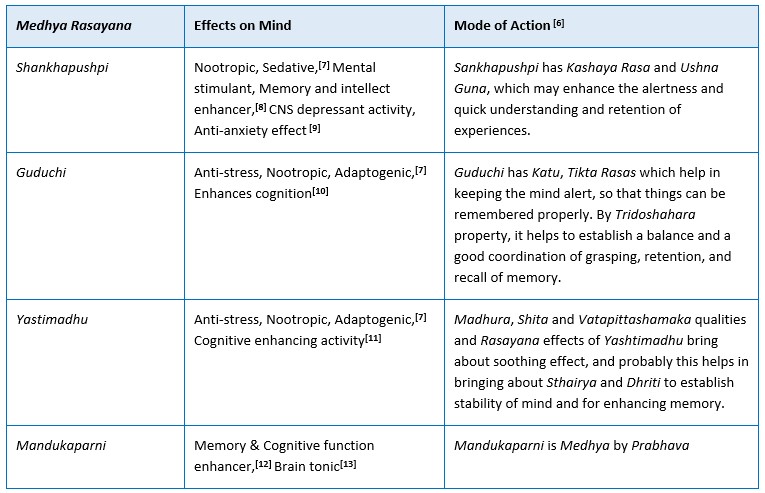A review on Ayurvedic concept of Mind with emphasis on Medhya Rasayana
DOI:
https://doi.org/10.21760/jaims.9.4.13Keywords:
Manas, Indriya, Medhya RasayanaAbstract
Ayurveda, a five-millennium-old science rooted in the Vedas, encompasses profound insights into health and healing. The traditional Indian medical system perceive the mind and body as complementary parts of one’s entity and purports to preserve the balance between the duo for enhanced quality of life. Moreover, the World Health Organization defines health as a condition of whole physical, mental, and social well-being rather than only the absence of illness or disability, indicating the significance of mind covering the mental health component. The term mind in Ayurveda is referred to as the Manas, and it is one among the Tristhuna, the three pillars quintessential for a healthy life. Acharya Caraka has included Manas in Adhyatama Dravya Guna Sangraha, since true perceptions occur only when Manas is actively engaged with the body and senses. Satva and Chetas are considered as synonyms of Manas. Also, Rashipurusha involved in Srishti Utpatti is depicted as an amalgamation of Atma, Buddhi, Indriya, Manas, Indriyaartha, and Mano-Vishyas. The Satva is considered as unique Guna entity of Manas while Rajas and Tamas are Mano- Doshas. Swastha Avastha of Sareera is invariably linked to Satva Guna where on the contrary Mano-Doshas manifest as diseases. Acharya Caraka emphasizes that whatever comes under the purview of Mana and its knowledge are all its Vishayas, Chintana being the most important. The use of Medhya Rasayana has been advocated in Ayurveda in this regard for its supreme functioning and to ward off diseases caused by Sareerika and Manasika Doshas.
Downloads
References
Venkoba Rao, Mind in Ayurveda. Indian journal of Psychiatry 44(3)201-211 (2002).
Murthi A. R. V, The mind in ayurveda and other Indian traditions. Chaukhamba Sanskrit Pratishthan, Delhi (2013).
Murthi A. R. V, The mind in ayurveda and other Indian traditions. Chaukhamba Sanskrit Pratishthan, Delhi (2013).
Yadavji Trikamji, Charak samhita of charak, Shareer Sthana, Chaukhamba Sanskrit series, Varanasi, (2004).
Yadavji Trikamji, Charak samhita of charak, Shareer Sthana, Chaukhamba Sanskrit series, Varanasi, (2004).
Sarokte AS, Rao MV. Effects of Medhya Rasayana and Yogic practices in improvement of short-term memory among school-going children. AYU (An international quarterly journal of research in Ayurveda). 2013 Oct 1;34(4):383-9.
Mehta CS, Dave AR, Shukla VD. Comparative effect of Navayasa Rasayana Leha and Medhya Rasayana tablet along with Dhatryadhyo Lepa in Ekkakushta (psoriasis). AYU (An international quarterly journal of research in Ayurveda). 2013 Jul 1;34(3):243-8.
Sharma R, Singla RK, Banerjee S, Sinha B, Shen B, Sharma R. Role of Shankhpushpi (Convolvulus pluricaulis) in neurological disorders: An umbrella review covering evidence from ethnopharmacology to clinical studies. Neuroscience & Biobehavioral Reviews. 2022 Sep 1;140:104795.
Devi P. An updated review on Shankhpushpi-as Medhya Rasayana. J Ayurvedic Herb Med. 2021;7(2):119-23.
Agarwal A, Malini S, Bairy KL, Rao MS. Effect of Tinospora cordifolia on learning and memory in normal and memory deficit rats. Indian journal of pharmacology. 2002 Sep 1;34(5):339-49.
Chakravarthi KK, Avadhani R, Narayan RS. Effect of Glycyrrhiza glabra root extract on learning and memory in wistar albino rats. Drug Invention Today. 2012 Aug 5;4(7):387-90.
Rao SB, Chetana M, Devi PU. Centella asiatica treatment during postnatal period enhances learning and memory in mice. Physiology & behavior. 2005 Nov 15;86(4):449-57.
Zahara K, Bibi Y, Tabassum S. 01. Clinical and therapeutic benefits of Centella asiatica. Pure and Applied Biology (PAB). 2021 Oct 17;3(4):152-9.
Kulkarni R, Girish KJ, Kumar A. Nootropic herbs (Medhya Rasayana) in Ayurveda: an update. Pharmacognosy reviews. 2012 Jul;6(12):147.
Kumargarg A, Singh C, Adhlakha M, Kapoor R. Role of Medhya Rasayan in Geriatric Health Care WSR To Mental Health. International Ayurvedic Medical Journal {online}. 2017.















